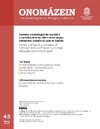Please use this identifier to cite or link to this item:
https://accedacris.ulpgc.es/jspui/handle/10553/72551
| Title: | Factores y estrategias del aprendiz preadolescente en chino como lengua extranjera. Estudio de caso en España | Other Titles: | Factors and learning strategies of preadolescents in Chinese as a foreign language. Case study in Spain | Authors: | Wang , Lili Cáceres Lorenzo, M. Teresa |
UNESCO Clasification: | 570111 Enseñanza de lenguas | Keywords: | Chinese As A Foreign Language Preadolescent Learning Strategies Chino como lengua extranjera Preadolescentes, et al |
Issue Date: | 2019 | Journal: | Onomazein | Abstract: | The presence of preadolescent learning Chinese as a foreign language (Chle) at the Confucius Institute at the University of Las Palmas (IC-ULPGC) led us to ask ourselves how they use learning strategies and their possible relationship between their personal and academic factors (L1, sex, monolingual/bilingual schools, score on the final exam-HSK) and their learning strategies. The research was carried out with 81 12-year-old students who attended the IC-ULPGC (Canary Islands, Spain) between 2012-2015, who were questioned about these factors and also applied the questionnaire on learning strategies of Rebeca Oxford (Strategy Inventory for Language Learning, version 7.0). Statistical analysis of the results show novel quantitative data, because teenagers do not have a high frequency in use of strategies; generally, the most widely used strategy is social, and less, cognitive, although the affective and metacognitive which have significant correlation with academic success. La presencia de preadolescentes que aprenden chino como lengua extranjera (ChLE) en el Instituto Confucio de la Universidad de Las Palmas de Gran Canaria (IC-ULPGC) nos llevó a preguntarnos cómo utilizan las estrategias de aprendizaje y su posible relación entre sus factores personales y académicos (L1, sexo, colegios monolingüe/bilingüe y puntuación en el examen final-HSK). La investigación se realizó con 81 estudiantes de 12 años que asistieron entre 2012- 2015 al IC-ULPGC (Islas Canarias, España), a los que se interrogó sobre los referidos factores y, además, se les aplicó el cuestionario de estrategias de aprendizaje de Rebeca Oxford (Strategy Inventory for Language Learning, versión 7.0). El análisis estadístico de los resultados muestra datos cuantitativos novedosos, porque los adolescentes no presentan una alta frecuencia en uso de las estrategias; además, de manera general, la estrategia más utilizada es la social, y la menos, la cognitiva, aunque son la afectiva y metacognitiva las que tienen correlación significativa con el éxito académico. |
URI: | https://accedacris.ulpgc.es/handle/10553/72551 | ISSN: | 0717-1285 | Source: | Onomazein [ISSN 0717-1285], n. 43, p. 157-175 |
| Appears in Collections: | Artículos |
Items in accedaCRIS are protected by copyright, with all rights reserved, unless otherwise indicated.
